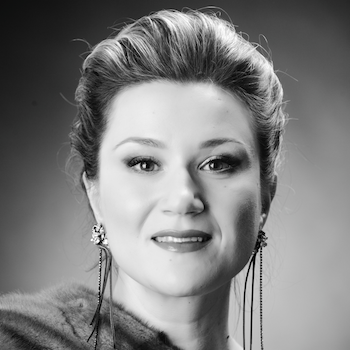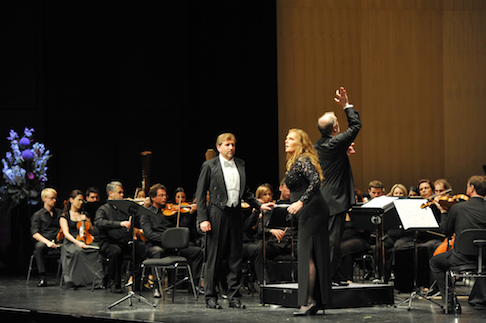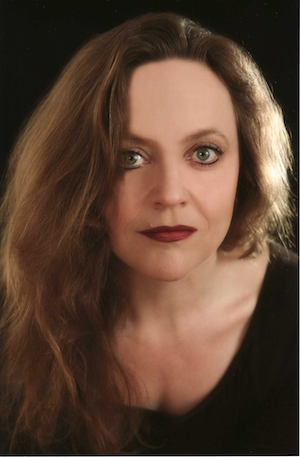
20 Jul 2016
Die Walküre, Baden-Baden
A cast worthy of Bayreuth made for an unforgettable Wagnerian experience at the Sommer Festspiele in Baden-Baden.
English Touring Opera are delighted to announce a season of lyric monodramas to tour nationally from October to December. The season features music for solo singer and piano by Argento, Britten, Tippett and Shostakovich with a bold and inventive approach to making opera during social distancing.
This tenth of ten Live from London concerts was in fact a recorded live performance from California. It was no less enjoyable for that, and it was also uplifting to learn that this wasn’t in fact the ‘last’ LfL event that we will be able to enjoy, courtesy of VOCES8 and their fellow vocal ensembles (more below …).
Ever since Wigmore Hall announced their superb series of autumn concerts, all streamed live and available free of charge, I’d been looking forward to this song recital by Ian Bostridge and Imogen Cooper.
Although Stile Antico’s programme article for their Live from London recital introduced their selection from the many treasures of the English Renaissance in the context of the theological debates and upheavals of the Tudor and Elizabethan years, their performance was more evocative of private chamber music than of public liturgy.
Evidently, face masks don’t stifle appreciative “Bravo!”s. And, reducing audience numbers doesn’t lower the volume of such acclamations. For, the audience at Wigmore Hall gave soprano Elizabeth Llewellyn and pianist Simon Lepper a greatly deserved warm reception and hearty response following this lunchtime recital of late-Romantic song.
For this week’s Live from London vocal recital we moved from the home of VOCES8, St Anne and St Agnes in the City of London, to Kings Place, where The Sixteen - who have been associate artists at the venue for some time - presented a programme of music and words bound together by the theme of ‘reflection’.
'Such is your divine Disposation that both you excellently understand, and royally entertaine the Exercise of Musicke.’
‘And there was war in heaven: Michael and his angels fought against the dragon; and the dragon fought and his angels, And prevailed not; neither was their place found any more in heaven … that old serpent … Satan, which deceiveth the whole world: he was cast out into the earth, and his angels were cast out with him.’
There was never any doubt that the fifth of the twelve Met Stars Live in Concert broadcasts was going to be a palpably intense and vivid event, as well as a musically stunning and theatrically enervating experience.
‘Love’ was the theme for this Live from London performance by Apollo5. Given the complexity and diversity of that human emotion, and Apollo5’s reputation for versatility and diverse repertoire, ranging from Renaissance choral music to jazz, from contemporary classical works to popular song, it was no surprise that their programme spanned 500 years and several musical styles.
The Academy of St Martin in the Fields have titled their autumn series of eight concerts - which are taking place at 5pm and 7.30pm on two Saturdays each month at their home venue in Trafalgar Square, and being filmed for streaming the following Thursday - ‘re:connect’.
The London Symphony Orchestra opened their Autumn 2020 season with a homage to Oliver Knussen, who died at the age of 66 in July 2018. The programme traced a national musical lineage through the twentieth century, from Britten to Knussen, on to Mark-Anthony Turnage, and entwining the LSO and Rattle too.
With the Live from London digital vocal festival entering the second half of the series, the festival’s host, VOCES8, returned to their home at St Annes and St Agnes in the City of London to present a sequence of ‘Choral Dances’ - vocal music inspired by dance, embracing diverse genres from the Renaissance madrigal to swing jazz.
Just a few unison string wriggles from the opening of Mozart’s overture to Le nozze di Figaro are enough to make any opera-lover perch on the edge of their seat, in excited anticipation of the drama in music to come, so there could be no other curtain-raiser for this Gala Concert at the Royal Opera House, the latest instalment from ‘their House’ to ‘our houses’.
"Before the ending of the day, creator of all things, we pray that, with your accustomed mercy, you may watch over us."
The doors at The Metropolitan Opera will not open to live audiences until 2021 at the earliest, and the likelihood of normal operatic life resuming in cities around the world looks but a distant dream at present. But, while we may not be invited from our homes into the opera house for some time yet, with its free daily screenings of past productions and its pay-per-view Met Stars Live in Concert series, the Met continues to bring opera into our homes.
Music-making at this year’s Grange Festival Opera may have fallen silent in June and July, but the country house and extensive grounds of The Grange provided an ideal setting for a weekend of twelve specially conceived ‘promenade’ performances encompassing music and dance.
There’s a “slide of harmony” and “all the bones leave your body at that moment and you collapse to the floor, it’s so extraordinary.”
“Music for a while, shall all your cares beguile.”
The hum of bees rising from myriad scented blooms; gentle strains of birdsong; the cheerful chatter of picnickers beside a still lake; decorous thwacks of leather on willow; song and music floating through the warm evening air.

A cast worthy of Bayreuth made for an unforgettable Wagnerian experience at the Sommer Festspiele in Baden-Baden.
Eva-Maria Westbroek (Sieglinde), Evelyn Herlitzius (Brünnhilde), Ekaterina Gubanova (Fricka), René Pape (Wotan) and Mikhail Petrenko (Hunding) sung on a scorching summer sunday under the guidance of Valery Gergiev and his Mariinsky Orchestra. Every singer produced sensational showstoppers. With such a cast a production is better left away.
The magnificent tenor Andreas Schager charmed the disappointed audience expecting a sick Jonas Kaufmann. With a touch of theatrical flamboyance Schager includes the audience intimately in his performance. As a singer he gives each of his characters his all. I have seen him go at it as Tannhauser in Ghent, Max in Der Freischütz in Berlin, and he was a major high point in Leipzig’s Ring Cycle last May, where he blew up the stage as Siegmund. Schager has also tackled Tristan in St. Petersburg with Gergiev, this evening’s conductor. His debut at the Met in NY is already programmed for the near future.
 Andreas Schager and Eva-Maria Westbroek
Andreas Schager and Eva-Maria Westbroek
Tonight, he returned as Siegmund for the Festspielhaus Baden-Baden, who managed to steal him away from his rehearsals for Der fliegende Holländer in his debut at Bayreuth. He again convinced as the overconfident hero. His performances have the sense that it might be his last.
From the moment Schager arrived on stage, the Austrian Adonis turned on his charm and dazzled. He has a soulful voice and big personality always intent on seducing the audience. In Leipzig, the Gewandhaus Orchestra was located in the pit, so he did not have the challenge of overcoming orchestral volume, a challenge he overcame most of the time with Gergiev and the muscular intensity of his body-builder Mariinsky. The challenge of balancing the volume was one of the few things that could have been more refined. But that was in Gergiev’s hands.
Schager’s chemistry with Westbroek was extraordinary. They elevated their duet to more than the sum of its parts. Their subtle acting and minimal gestures added great drama to this first act. Add to that the rich strings, swooning in their romance, and you were truly swept away as a listener. Schager and Westbroek’s fiery, passion moved me to tears. Epic was the revelation of his true name as first Sieglinde and then her brother exclaimed “Siegmund!”. It sent shivers down my spine.
Ms. Westbroek displayed her captivating acting skills, presenting Sieglinde highly expressive with great emotional authenticity, including her rich, relentless vibrato. She infused her declaration of love for her brother with generous exuberance. Later she contrasted this mania as she exuded a fearful malaise before Siegmund’s confrontation with her husband Hunding. A complete natural, her entire performance seemed hardly difficult, adding an almost laidback quality to the performance. How does she do it?
 Evelyn Herlitzius
Evelyn Herlitzius
Mikhail Petrenko must be admired for his flawless diction in German. You couldn’t detect his Russian accent at any point during his portrayal of Hunding, full of disdain and anger.
In Act II, Ekaterina Gubanova stole the show as the elegantly puritan and utterly disgruntled Fricka. Her voice commanded the stage, and she put Wotan to shame, in the best of ways, as Pape held his own. The climax of Act II had five world class singers on stage, and made for one of the most star-struck moments in opera that I have experienced. And one subtle moment of if-looks-could-kill emerged as Fricka arrived and Brünnhilde’s cheer diminished. That slight moment of eye-contact expressed volumes.
René Pape formidably portrayed Wotan with a sad, almost hopeless, resignation, as a leader at the end of his rule. In his interaction with Fricka in Act II, he displayed an authoritarian vocal prowess, demanding respect, yet still deeply human, perhaps too much so as God.
In Act III, Brünnhilde’s eight sisters threw themselves into Wagner’s vocal acrobatics as Gergiev turned the first half into a fully blown adrenaline rollercoaster. Yet it was the interaction between Wotan and Brünnhilde that left me helplessly sobbing, as the father cast his favorite daughter out of Valhalla. Such devastation I have rarely experienced from a stage performance. And while Wotan remains a bit distant, Evangeline Herlitzius turned me into an instant fan. Her Brünnhilde convinced in her virtuous optimism, but also displayed great dread for Wotan’s retribution. The singers elevated the performance to mythic heights.
In Act II Evangelina Herlitzius gave hint of what was later to come. But in Act III with Wotan she switched with seeming ease from upbeat enthusiasm, to great despair and all without too much theatricality. Her interaction with her disappointed father turned out to be the heartbreaking, gut wrenching finale that was necessary to conclude such a superlative concert.
Gergiev brought out the exhilarating passages of Wagner’s score. Brass sounded consistently brilliant or subtle with finesse in their simmering, swampy passages. Gergiev sustained a suspenseful momentum. He built up the Wagner’s tension effectively and knew to release it at the right moments.
With air conditioning, comfortable seating and such a stunning cast and orchestra, the question becomes…do you really need to still go to Bayreuth? Probably, because with a cast like this, it will be a long time before I will hear another so superlatively sung Die Walküre.
David Pinedo